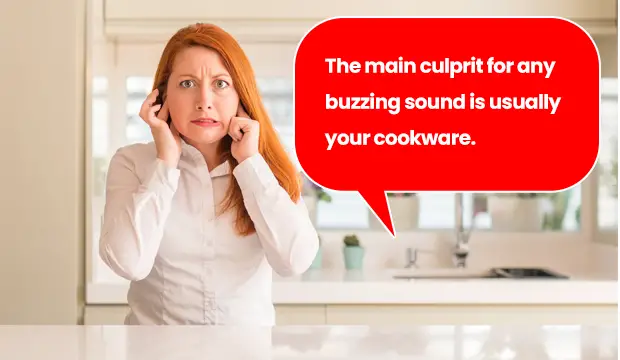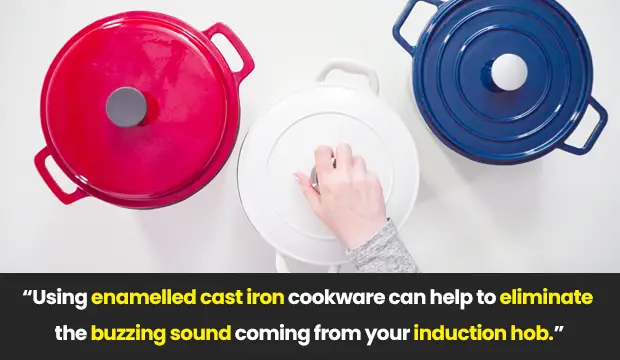Induction hobs are known to be remarkably fast, efficient and generally much safer than cooking with gas. But many newcomers to using this direct heating method are understandably alarmed to find their brand-new hob makes a variety of unfamiliar noises.
But before you contact the manufacturer to ask ‘why does my induction hob buzz?’ here are a few possible reasons for that buzzing sound.
Cooking with Electromagnetics

Your induction hob runs on electricity, but it uses electromagnetics to cook your food. Beneath the toughened safety glass there are coils of wire that generate the electromagnetic field. They also indicate the cooking zones where your pans should be placed.
When your hob is switched on, the electromagnetic field only begins to heat the food when the pan is in contact with the glass. The pan completes the electromagnetic circuit and produces heat when its molecules oscillate or vibrate.
You’ll notice the glass stays cold as the technology bypasses any obstructions to only act upon the contents of the saucepan. The oscillation involved in induction cooking is actually a noiseless process. The main culprit for any buzzing sound is usually your cookware.
Why do my Pans make Noises on an Induction Hob?
To connect with the electromagnetic field, your cookware has to contain magnetic, ferrous material. This is usually present in cast iron and most stainless steel pans. Aluminium and copper pans aren’t magnetic and won’t be able to complete the circuit on their own.

Multi-purpose cookware usually gets around this problem by including a layer of magnetised material in the base. Although versatile with any type of hob, it’s generally this ‘thermal sandwich’ that causes a constant buzzing.
Pans with Multi-Layered Bases
Some of your existing pans might be aluminium with a sandwich at the base that contains magnetised ferrous steel. Others could be magnetic stainless steel with a layer of aluminium for improved heat distribution. Both types of pans should work with your new induction hob.
Although the layers are bonded into a rigid base, the molecules within the materials still have the ability to react with each other when electromagnetics are involved.
This imperceptible vibration is what usually causes a constant humming which can become very irritating. But there is an easy solution.
What are the Best Pans for Induction Hobs?

To avoid any disturbing buzzing, it’s wise to invest in a new set of pans. The best cookware has a solid, single-piece construction with a particularly heavy base.
The best choice is enamelled cast iron. It’s entirely magnetised and it’s heavy enough to stay firmly in place. It creates the best connection with the electromagnetic field without any risk of buzzing. The lids are usually equally as heavy, helping them to resist rattling when in use, unlike lightweight aluminium versions.
The only hazard is to make sure you are careful when using heavy pans. Dropping a substantial cast iron pot on the toughened glass can cause it to crack, leading to an expensive repair.
Why does my Induction Hob make Noises when Using Cast Iron Pans?
Even if you have the very best cast iron cookware, your induction hob may still make noises. As a technologically advanced appliance, it often has a touch screen panel with various controls. Any spillages in this area react with electricity rather than electromagnetics.
Keeping the panel clean should prevent any unusual popping sounds. If you are simultaneously using any other electronic equipment in the kitchen, it can contribute to soundwave interference.
Finding the Right Power Level
Each pan has its own size, density and weight. When you select a heat level, the electromagnetic oscillation can sometimes react with the individual pan. The slight buzzing noise you’ll hear can usually be eliminated by altering the heat setting.
It takes a little trial and error to adjust the setting for each pan. However, you’ll soon instinctively know how each pan reacts and increase or decrease the settings accordingly.
Ensuring the pan is a good match for the size of the burner should also improve any strange noises.
Conclusion
The electromagnetic operation of an induction hob is noiseless, so why does my induction hob buzz? It’s usually the fault of your multi-layered cookware.
You can also experiment with the power levels as even a minor adjustment can eliminate any irritating buzz by reducing oscillation.
